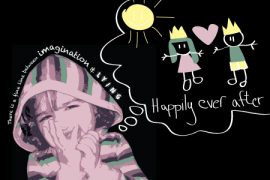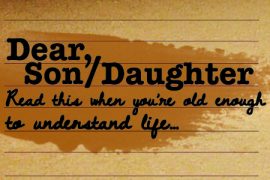Article in brief: Divorce can be a traumatic experience to cope and adjust with, not only for parents but also for children. However, if custodial parents help children to be resilient by managing the divorce transition, this can lessen the impact of divorce and help them to cope and move on.

I don’t know how or why or when the relationship reached a dead end. I just know it happened after a long period of torture and depression and now I am a single mother– a divorced mother.
Parents go through lots of problems and tension in their marriage life that makes sacrifice, patience and forgiveness very hard, but it is possible to cope with the divorce to have an inner peace and decide to let go of the anger and pain to move on to a healthier place. When parents’ world turns upside down and the relationship reaches a stage where marriage life becomes unbearable, they do not have any other choice but getting officially divorced. Such a decision can free them from the prison of their past and pain and eases their life journey ahead.
However, parents who are divorced do not just go their separate ways, especially if they have children together, they have a never-ending relationship with their former spouse whether they like it or not. They start to manage between their children and their former spouse to embrace the opportunity for change. After the distress of divorce, the court gives one of the parents the custody of children, where one has the larger timeshare with their children as a custodial parent than the other. Even though the custodial parent has legal custody of the child, the non-custodial parent has the right of regular visitation under agreed times and conditions which the custodial parent must comply with for the child benefit.
“What kind of parent are you?” – parents should overlook the tiny voice in their head telling them that they are not good enough to handle their children, or else, being divorced can make them sink into a sense of failure that might have a negative impact on raising their children. It is crucial that parents stay calm and give their children tender loving care that will reflect positively on the children’s development. Parents should be aware that involving children in their negative emotions and the effect of divorce can hit them the hardest.
“Why are my parents divorced?” – a question that will remain vague for many children. Some children from single parent homes can turn out fine and others may face psychological issues that can expose them to risks of depression, learning disabilities, anxiety and insecurity. The trauma of divorce for some children can make them feel that their worlds are falling apart because some parents were not able to manage the stresses of divorce to make them adjust with their new life style.
Other children, when realizing that one of the parents is no longer living with them in the same place, start to become very anxious and insecure. Each time the non-custodial parent visits and drops children home like a stranger they start pleading: “Please come inside. Don’t you want to come? Why are you not sleeping here?” It becomes very stressful for some children, to the point where they start to develop behavioral problems like anger and disobedience and psychological problems like depression for prolonged periods of time. Children always need both parents to stay involved in their lives. Nothing and no one can deny this truth.
But the custodial parent needs to help children to be resilient by managing the divorce transition, which can lessen the impact during and after a divorce. The custodial parent who takes care of the children’s wellbeing most of the time needs to make sure not to pull these innocent children into the confusion of both parents. It’s healthier not to tell children about parents’ conflicts and concerns to keep these issues out of their life[i].
Parents may feel somehow guilty since their children are very miserable because of their divorce, so they start providing them lavish gifts all the time to make them feel special and secured. However, children develop the sense of security by having consistent rules with negative and positive consequences on their behavior. Parents should assure children that both parents love them, and the divorce trauma was caused because of grown-ups issues and concerns that have nothing to do with the children’s behavior.
Parents can help their children adjust to divorce by being aware that children react to divorce differently at different ages. At infancy, babies are able to feel the tension in the home even though they are not able to understand the reasoning for the conflict. If the tension continues young children become clingy and more irritable.
Children need a consistent routine that helps comfort them, their daily sleeping, eating, and playing schedules need to be predictable and must include quality time between the parents and the children. Older children need to talk and express their feelings. School-aged children are better able to express their feelings and they tend to see the world in black and white, and may try to place blame on the parents for the divorce. Reading books together with children about divorce is an important strategy to use to help children adjust with new life transitions.
In the end, both parents need to support children to cope with the divorce and make the process and its results less traumatic for the children and that means providing stability. Tragically, some parents think that applying a pattern of tit-for-tat revenge between each other after a divorce can fulfill an inner peace and turn their life to a bed of roses.
But if they decided to start threatening one another with lawsuits, life will definitely turn sour and children will be put on a downhill drive. Parents should hand their children the tools for their own survival that will ultimately turn their life to an impressive journey.
Written in collaboration with Arabian Child organization. Visit www.arabianchild.org for more information about early childhood education in the United Arab Emirates.
© No portion of this publication may be copied, reproduced or transmitted in any form or by any means, electronic or mechanical, without written permission from the author.
[i] Waite, Gallagher. (2014). What are the possible consequences of divorce for adults? . Should I Keep Trying to Work it Out?. 6 (1), p1-16.



